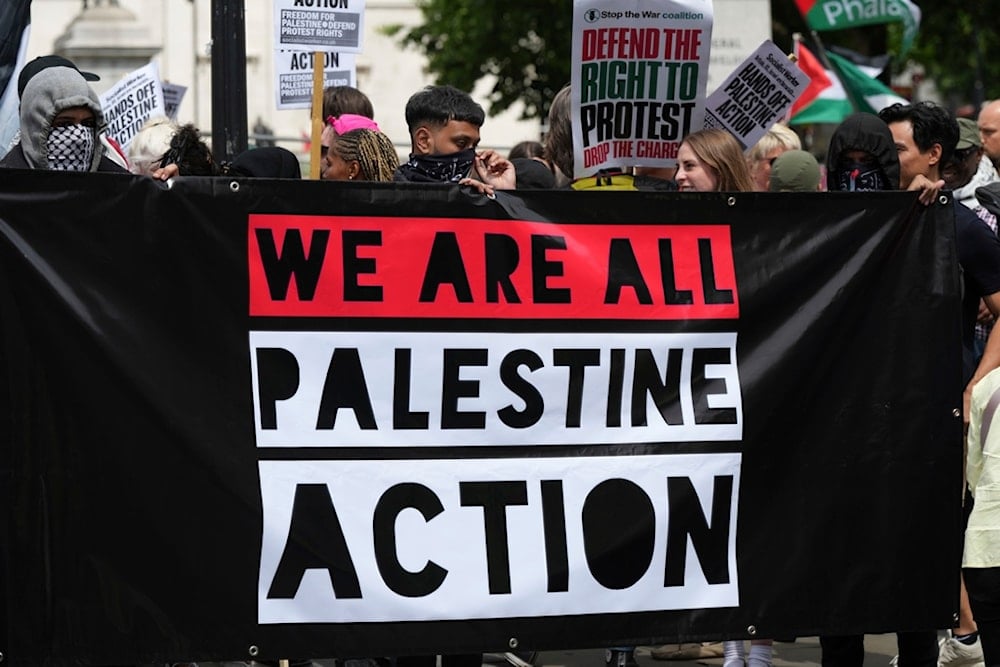UK signals 'terror' ban on 'Palestine Action', sparking protests
Cooper’s announcement has triggered fresh protests across central London.
-

Demonstrators hold up a banner during a protest by Palestine Action group in London, Monday, June 23, 2025 (AP Photo/Frank Augstein)
The British government is moving to designate Palestine Action as a terrorist organisation, a decision that has sparked widespread concern among civil rights advocates and pro-Palestinian supporters.
According to British news outlets, Home Secretary Yvette Cooper announced that a draft proscription order would be brought before Parliament in the coming days, potentially criminalising membership in or support for the direct-action group.
Cooper described the group's activities as "the latest in a long history of unacceptable criminal damage," adding that actions like the recent RAF base protest "do not represent legitimate or peaceful protest." She asserted that "the UK's defence enterprise is vital to the nation's national security and this government will not tolerate those that put that security at risk." However, she also stated that the proscription "would not restrict peaceful protest," seeking to differentiate between disruptive activism and lawful political expression.
The move follows a high-profile protest at RAF Brize Norton in Oxfordshire, where two Palestine Action activists infiltrated the base at night, defacing two Voyager aircraft used to refuel allied jets and transport government officials. The activists sprayed red paint into aircraft engines, damaged components with crowbars, and unfurled a Palestinian flag on the tarmac, actions the group described as a symbolic indictment of British complicity in what it calls genocide in Gaza.
Activism Criminalized
Cooper’s announcement has triggered fresh protests across central London. After police banned a planned demonstration outside Parliament, hundreds of activists and supporters regrouped in Trafalgar Square, where clashes broke out between protesters and police. Several arrests were reported by the Metropolitan Police, which cited public order concerns. Critics say the move to suppress protest activity mirrors the government’s broader attempt to delegitimize dissent under the guise of national security.
Just came back from the “We are all Palestine Action” (@Pal_action) protest against @YvetteCooperMP’s proposed ban of the group as “terrorist.”
, Asa Winstanley (@AsaWinstanley) June 23, 2025
Riot police were very aggressive and appeared to make several arrests. I saw assaults by police against peaceful protestors pic.twitter.com/oovhqzmvcZ
Palestine Action, founded in 2020 by British-Palestinian activist Huda Ammori and co-founder Richard Barnard, is known for its confrontational yet non-lethal tactics aimed at arms companies tied to "Israel's" military-industrial complex. Previous campaigns have led to the temporary shutdown of Elbit Systems-linked factories in Oldham and Tamworth, as well as disrupted contracts with Israeli weapons suppliers.
In response to the RAF protest, authorities moved quickly to suppress related demonstrations, dispersing planned rallies outside Parliament and pushing protesters into Trafalgar Square. Several arrests were made, with the Metropolitan Police citing public order risks. Meanwhile, counter-terrorism police have launched a broader security review across UK military installations.
Legal experts have raised doubts about whether Palestine Action meets the statutory requirements for proscription under the Terrorism Act 2000, which include posing a real threat to national security or British citizens. Critics argue that the group's actions, while disruptive, remain rooted in civil disobedience rather than terrorism.
Read more: UK seeks to ban Palestine Action over RAF base protest
The proposed ban has renewed scrutiny of UK-"Israel" cooperation, with campaigners pointing to past evidence of coordination between British counterterrorism units and the Israeli embassy. Concerns are growing that this measure could set a precedent for further repression of pro-Palestinian activism.
Families of detained activists face deepening uncertainty, as support efforts, ranging from legal aid to court appearances, could be criminalized. Foreign nationals involved in the group may also face deportation or visa revocation if the ban is enacted.

 4 Min Read
4 Min Read










